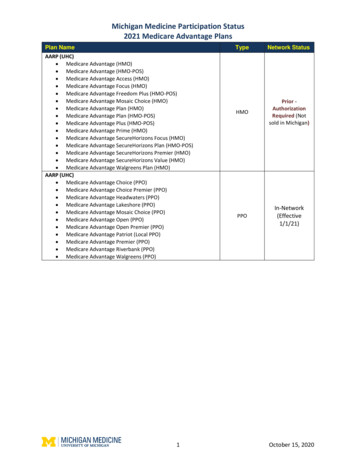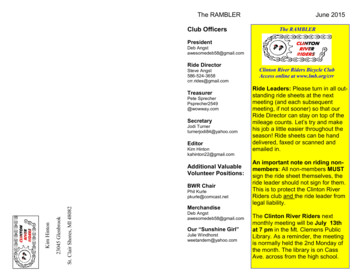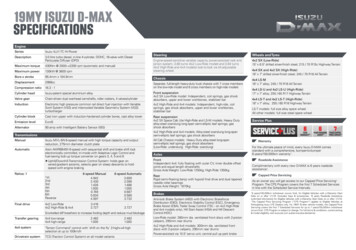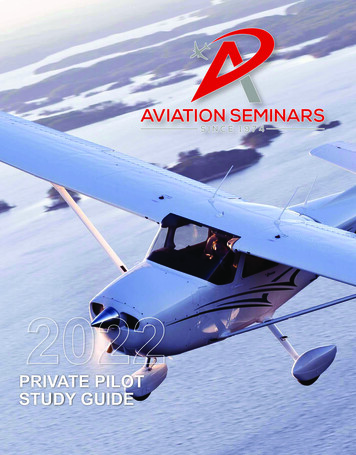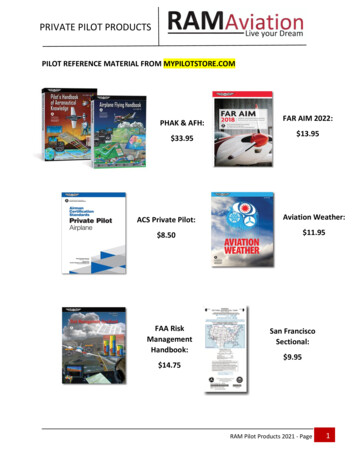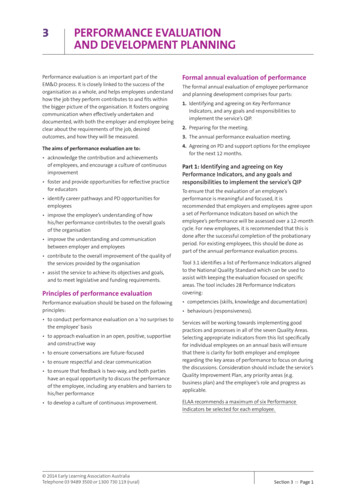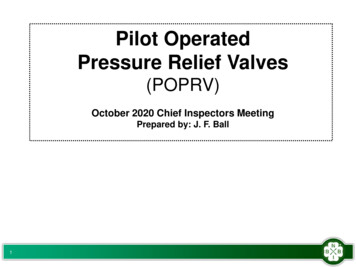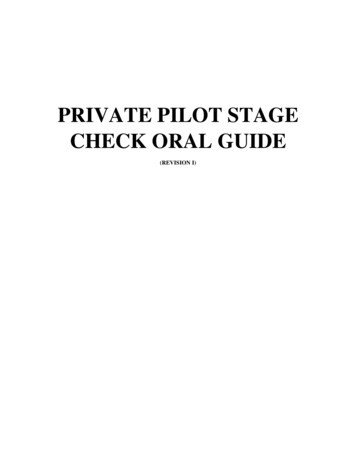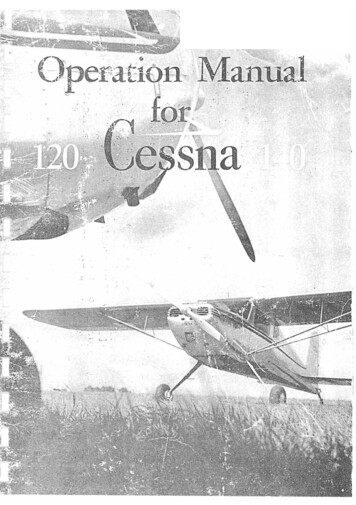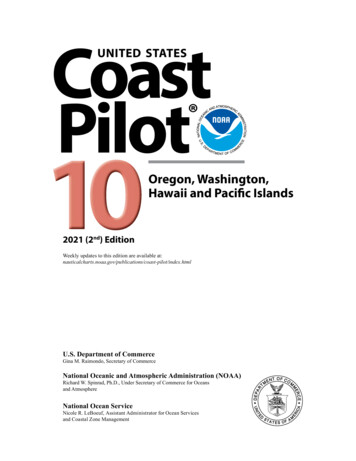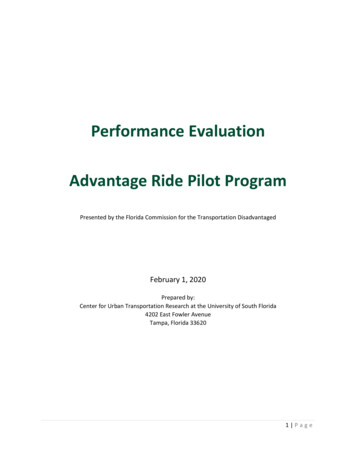
Transcription
Performance EvaluationAdvantage Ride Pilot ProgramPresented by the Florida Commission for the Transportation DisadvantagedFebruary 1, 2020Prepared by:Center for Urban Transportation Research at the University of South Florida4202 East Fowler AvenueTampa, Florida 336201 Page
ContentsExecutive Summary. 4Background . 6Transportation Programs Serving Individuals with Intellectual/Developmental Disabilities (IDD) . 6Florida Agency for Persons with Disabilities (APD) . 6Florida Commission for the Transportation Disadvantaged . 6Florida Developmental Disabilities Council (FDDC) – Transportation Voucher Pilot Projects . 7Other Transportation Programs. 72017 Transportation Disadvantaged Services Task Force . 8Advantage Ride Pilot Program Overview . 8UZURV . 8Program Objectives . 9Scope of Services. 9Operations . 10Continuation of the Pilot and Challenges with Sustainability. 11Performance Evaluation. 13Transit Performance Evaluation . 13Ridership (Trips) . 13Ridership (Unduplicated Riders) . 17Demand . 17On-Time Performance. 20Average Trip Lengths and Durations . 21Cost Efficiency . 22Performance in Customer Satisfaction . 23Survey 1. 24Survey 2. 26Overall Assessment and Future Considerations . 322 Page
List of FiguresFigure 1- Project Timeline . 12Figure 2 - Monthly Trips . 14Figure 3 - Accumulative Total Trips. 14Figure 4 - Average Daily Ridership by Month . 15Figure 5 - Origin of Advantage Ride Trips . 16Figure 6 - Total Wheelchair Trips . 17Figure 7 - Average Daily Ridership by Month . 18Figure 8 - Total Ridership by Day of the Week . 19Figure 9 - Driver Hours by Day of the Week . 19Figure 10 - Distribution of Trips by Hours of Day. 20Figure 11 - Cancellation Reason . 21Figure 12 - Rider Cancellation Rates . 21Figure 13 - Distribution of Trip Distance . 22Figure 14 - Distribution of Trip Time . 22Figure 12 – Impact of Distance on Cost Efficiency . 23Figure 16 – Total Trips per Week Prior to using Advantage Ride . 28Figure 17 – Total Trips per Week Since using Advantage Ride . 28Figure 18 - Forms of Transportation Before Advantage Ride . 29Figure 19 - Favored Qualities . 29Figure 20 - Performance Scoring. 30Figure 21 - Advantage Ride Trip Purposes . 303 Page
Executive SummaryTransportation plays a critical role in an individual’s ability to participate in and contribute to theircommunity. Yet it is one of the most significant barriers for individuals with intellectual ordevelopmental disabilities (IDD) to live, learn, work and play in their community. Though programs existto support community transportation for individuals with IDD, including the Agency for Persons withDisabilities Medicaid Waiver and Transportation Disadvantaged Program, these options may be limitedto certain destinations or activities, such as day care programs or medical appointments.The Florida Legislature directed the Commission for the Transportation Disadvantaged to administer the“Advantage Ride” pilot program to test new ways of improving the “transportation services experience”for this population. Beginning in January 2019, the Commission entered into a contract with UZURV, anadaptive transportation network company (TNC), to provide on-demand, door-to-door and scheduledtransportation options for individuals with IDD in Hillsborough, Manatee and Pinellas Counties. Theprogram has served approximately 483 individuals and provided over 20,000 trips in 2019.This report provides an overview of the Advantage Ride pilot program and its performance betweenJanuary 29, 2019 and October 31, 2019. The Commission contracted with the Center for UrbanTransportation Research (CUTR) at the University of South Florida to assist with data analyses andevaluating the program’s performance in meeting its objectives, including: Customer Satisfaction – Overall, the program received very positive feedback from participantsregarding their transportation experience. The report provides a summary of customersatisfaction survey responses on key areas of performance, including safety, on-timeperformance, convenience, and experience with drivers. Ridership – The program experienced a significant increase in ridership over the course of thepilot, from 157 customers in March to 483 customers in October 2019. Despite the introductionof a rider co-pay and cap on total trips (beginning in July 2019), ridership and demand forservice continued to grow. Demand – Growth in demand posed a significant challenge to the program’s sustainability. Theaverage trip count grew from 12.4 trips per day in February to 109 trips per day in June 2019.The report chronicles the efforts that were made to maintain funding ( 500,000) through FiscalYear 2019-20, and their subsequent impact on demand. Despite these efforts, demand forservices continued to exceed funding available to maintain the program through June 30, 2020.As of the publication of this report, funding is expected to expire on or before February 29,2020. On-Time Performance – The program exceled on on-time performance, where 99 percent of alltrips were made within the scheduled pick-up time. Further, the program experienced a lownumber of rider “no-shows” (596) and trip cancellations (2,399) between January 29 andOctober 31, 2019, and only 29 of those cancellations were because of an unavailable driver,driver cancellation or administration error. Trip Lengths and Durations – The average trip length for program participants was 10.7 milesand over 70 percent of all trips traveled less than 15 miles to their destination. The average trip4 Page
duration for program participants was 23 minutes and 49.4 percent of all trips took less than 20minutes to reach their destination. The program allowed for participants to take trips acrosscounty lines; however, the majority of trips occurred within the county lines of Hillsborough andPinellas (only 4 percent of trips were within Manatee County and less than 1 percent wereoutside of the three counties of service). Program Costs – The Advantage Ride pilot cost 886,684, of which 26,998 was funded byriders through the implementation of rider copayments, and the remaining 859,686 wasfunded by the pilot program. A portion of the total costs included the cost of rider educationand program setup administration. Given the investigative nature of pilot programs, the costmodel over the life of the project have changed. The initial cost structure was based on bestestimates of delivering service to the three-county area. Additionally, comparisons betweenservice areas cannot be easily compared due to the wide array of circumstances that go intocost determinations for transportation services for vulnerable populations. Further, the unitcosts are difficult to compare because the pricing model, which is based on a flat rate plus a permile rate, results in shorter trips costing more per mile compared to longer trips.The report concludes with an assessment and discusses factors to consider if the pilot is continued orapplied to other regions or programs serving individuals who are transportation disadvantaged.5 Page
BackgroundIndividuals with intellectual or developmental disabilities (IDD) have the same desire as people withoutdisabilities to live, work, learn and play in their community. Transportation plays a critical role to theirindependence and community inclusion. Yet many of these individuals are confronted by uniquebarriers that limit their access to activities in the community, including employment, health care, andsocial recreation. The limitation of transportation options is often cited as the most significant barrierconfronting this population.Transportation Programs Serving Individuals with Intellectual/DevelopmentalDisabilities (IDD)Florida Agency for Persons with Disabilities (APD)APD administers the Medicaid Home and Community-Based Waiver, which provides long-term care andother supports to help individuals live and participate in their community. Individuals must have one ofthe diagnosed developmental disabilities defined in Chapter 393, Florida Statutes, to qualify for waiverservices, including intellectual disability, cerebral palsy, autism, spina bifida, Down syndrome, PhelanMcDermid syndrome, or Prader-Willi syndrome. APD serves over 57,000 individuals with IDD, whichincludes over 21,000 on the waiting list to receive waiver services.Approximately 11,600 individuals are receiving transportation services through the APD Waiver. Theseservices are usually delivered by the individual’s caregiver or waiver provider organizations, such asresidential habilitation and adult day training facilities. An individual must have transportation identifiedon his or her waiver service plan to qualify for APD-sponsored trips, which is determined by a casemanager (known as a “Waiver Support Coordinator”). APD also encourages individuals and theirproviders to utilize public transportation options, if available and appropriate for the individual.Florida Commission for the Transportation DisadvantagedThe Florida Legislature created the Commission in 1989 to ensure the availability of transportationservices throughout the state for individuals who are transportation disadvantaged (TD), due todisability, low-income or age. The Commission accomplishes its mission through “coordinatedtransportation,” where it contracts with transportation operators and other organizations (known as“Community Transportation Coordinators” or CTCs) responsible for facilitating transportation servicesfor the TD population, including individuals with IDD, in each county of the state. The TD program isestablished in Chapter 427, Florida Statues.The Commission administers the Transportation Disadvantaged Trust Fund, which disburses funds to theCTCs to support trips to activities in the community, including health care, employment, education,nutrition, and other life-sustaining activities. CTCs and their local coordinating boards may prioritizefunding for trips to certain activities, such as dialysis or cancer treatments. The Commission also workswith state and local programs, including APD, to purchase trips through the CTCs to support theirconstituents who are transportation disadvantaged.6 Page
The majority of trips delivered by CTCs are multi-loaded, paratransit services and subsidized bus passprograms. Some CTCs subcontract with taxi or transportation network companies (TNCs), whereavailable, to provide “on-demand,” door-to-door trips for certain circumstances.In 2019, the Florida Legislature created the Multi-Use Corridors of Regional Economic Significance (MCORES) program, which included an additional 10 million in recurring funding to the TD Trust Fund. Thelegislation (s. 338.2278, F.S.) directs the Commission to award this funding through competitive grantsto CTCs and TNCs to support door-to-door, on-demand, and scheduled transportation services thataccomplish one of the following objectives:1. Increase a transportation disadvantaged person’s access to employment, health care,education, and other life-sustaining activities;2. Enhance regional and cross-county mobility; or3. Reduce barriers to accessing a transportation hub.This new funding may create opportunities for the Commission and its partners to explore similarservice models that are being implemented through the Advantage Ride pilot program.Florida Developmental Disabilities Council (FDDC) – Transportation Voucher Pilot ProjectsThe FDDC is a private, nonprofit corporation, federally funded under the Developmental DisabilitiesAssistance and Bill of Rights Act. The FDDC awards contracts for various initiatives impacting childrenand adults with IDD and their families, including transportation-related projects. In 2017, the FDDCreported findings on two funded transportation voucher pilot programs that explored new approachesto increase access to affordable, accessible, transportation options for individuals with IDD in an urbanand rural community in the state: Hillsborough Area Regional Transit (HART) – The FDDC and Florida Department ofTransportation (FDOT) funded the urban voucher pilot at 150,000 for one year in HillsboroughCounty. The HART voucher pilot funded 27,813 trips at a savings of 556,260 and became selfsustaining, reflective of a local systemic change outcome. Citizens for Improved Transportation (CIT) – The FDDC and FDOT also funded a rural voucherpilot in DeSoto, Glades, Hardee, Hendry, Highlands, Okeechobee, and Palm Beach Counties.During the second year, the project’s work focused primarily on the cities within Palm BeachCounty. The CIT voucher pilot provided a total of 7,441 trips, serving roughly 300 individuals andcovering over 126,000 miles. However, the rural pilot experienced challenges with sustainabilitydue to low rider participation and inability to purchase trips through TNCs, which was prohibitedby the FDOT for use of its funding at that time. The FDDC solely funded the project for thesecond year to see if it could become self-sustainable.In September 2019, the FDDC allocated 1.2 million for the next two years (contingent upon federalawards) to fund projects that could replicate the successful Hillsborough Transportation Voucher PilotProject in up to eight counties statewide. The FDDC plans to issue Invitations for Proposals for up to fiveone-year replication projects at 150,000 each between February 1 and July 1, 2020.Other Transportation Programs7 Page
The Americans with Disabilities Act (ADA) of 1990 requires public transit agencies that provide fixedroute service to provide “complementary paratransit” service to people with disabilities, includingdevelopmental disabilities, who cannot use the fixed-route bus because of a disability. In general, ADAcomplementary paratransit services must be provided within ¾ of a mile of a bus route or rail station,during the same hours and days the fixed route operates and for no more than twice the regular fixedroute fare.The Florida Agency for Health Care Administration (AHCA) administers the Non-EmergencyTransportation (NET) program, which provides services to Medicaid recipients to access medical care ifthey are unable to drive, cannot afford to own or maintain a vehicle, or do not have access to affordabletransportation. Individuals enrolled in the Statewide Medicaid Managed Care program, includingrecipients with developmental disabilities, may receive NET services through their managed care plan asa covered service.2017 Transportation Disadvantaged Services Task ForceDuring the 2017 Florida Legislative Session, the Legislature created a task force to examine the designand use of transportation disadvantaged services, with a specific emphasis on individuals withintellectual or developmental disabilities. The task force was assigned to the Agency for Persons withDisabilities and included the Commission for the Transportation Disadvantaged and other keystakeholders. As part of the task force objectives, the Legislature directed APD to contract with anindependent consultant to “examine the state’s transportation disadvantaged services, how suchservices are provided in urban and non-urbanized areas and how to assist in the development and use ofdifferent provider models.”The University of South Florida Center for Urban Transportation Research (CUTR) conducted theTransportation Disadvantaged State-Wide Service Analysis study on behalf of the task force. The resultsand recommendations of the CUTR study included an innovative pilot program to provide a customeroriented mobility service model for persons with IDD. The intent of the pilot program was to explorenew techniques, technology and applications on a trial basis, to learn, refine and consider long termchange that can significantly improve mobility services for customers.Advantage Ride Pilot Program OverviewDuring the 2018 Florida Legislative Session, the Legislature tasked the Commission for theTransportation Disadvantaged to “competitively procure an entity that can provide a transportationservices experience” for individuals with developmental disabilities, as defined in s. 393.063, F.S.,consistent with recommendations made by the task force and CUTR report in 2017. The Legislatureappropriated 500,000 for the Commission to administer the pilot program in FY 2018-19.The Commission, with technical assistance from the FDOT, conducted a competitive procurement andselected UZURV to provide services for the “Advantage Ride” pilot program to eligible individuals inHillsborough, Manatee and Pinellas Counties. The Commission also contracted with CUTR to assist withdata analyses and the performance evaluation of the program.UZURV8 Page
UZURV is an adaptive transportation network company (TNC). Its mission is to provide access to a betterquality of life for all people through on-demand, reliable transportation, with credentialed drivers ableto serve those who require a "higher level of care.” UZURV serves a variety of customers, includingclients served by American Cancer Society, using standard and wheelchair accessible vehicles.Reservations can be made through a call center.UZURV promotes safety, security and reliability of on-demand transportation to its customers, who canselect certified drivers and vehicles that match their specific needs. Highlights of UZURV’s servicecharacteristics include: Certified Drivers – Drivers are trained and certified in CPR, first aid, and disability sensitivity.Rider Safety – UZURV has a technology platform and real-time ride oversight team that trackevery ride during all hours of program operation to ensure rider safety. Caregivers can also trackthe real-time status of rides though the call center and technology platform.Service Quality – Riders can schedule trips at least two hours in advance and receive door-todoor, one-on-one transportation. Riders can also choose their favorite driver.Program ObjectivesA. Improve an individual’s and individual’s caregiver awareness of and ability to use thetransportation system in their area through travel training, outreach activities, and othermethods;B. Use drivers who are trained to understand the sensitivity challenges associated with personswith intellectual or developmental disabilities;C. Provide various ways for an individual or individual’s caregiver to schedule an immediate ride ora ride for a later date;D. Enhance a rider’s personal safety before, during and after a trip;E. Provide, at a minimum, door-to-door services and transportation that crosses county lines, ifrequested by the individual or individual’s caregiver;F. Ensure a rider is picked-up and dropped-off at the appointed time and place;G. Establish a transportation network that ensures a person with special mobility needs has accessto accessible vehicles;H. Provide cost-effective transportation; andI. Collect data to measure transit performance.The Commission facilitated an Advantage Ride advisory subcommittee that convened on a monthly basisto review and report on the progress of the program meeting the above objectives. The subcommitteeconsisted of representatives of the Commission, UZURV, APD, FDDC, Family Care Council, Florida SelfAdvocacy Network’D (FL SAND), Department of Elder Affairs, and CUTR.Scope of ServicesThe scope of service for the Advantage Ride pilot program included the following elements:9 Page
Eligibility – Individuals were eligible to participate in the program if they are receiving servicesthrough the APD Waiver and Waiting List and reside in Hillsborough, Manatee or PinellasCounty. The Commission and APD established a data-sharing agreement, meeting therequirements of the Health Insurance Portability and Accountability Act (HIPAA), where APDprovided the Commission with an encrypted list of Waiver and Waiting List clients who reside inthe three counties of service, which was updated on a monthly basis.Services – UZURV provided on-demand and scheduled trips to eligible individuals inHillsborough, Manatee and Pinellas Counties. Eligible individuals could take trips across countylines, if requested. Riders could also request a wheelchair accessible vehicle (WAV) if they havespecial mobility needs.Outreach and Awareness – During the first months of operations, UZURV provided traveltraining and outreach activities for eligible participants and their caregivers. UZURV collaboratedwith the Commission, FDDC, and APD to develop appropriate travel training materials andcommunicate with key stakeholder groups. Between January 29, 2019, and March 31, 2019,UZURV conducted 16 outreach and education sessions, 8 customer training sessions and 2vendor sessions.Sensitivity Training – In addition to training related to safety (discussed below), UZURVcollaborated with the Commission and FDDC to develop sensitivity training, specialized inserving persons with intellectual or developmental disabilities, for all drivers and call centerstaff.Scheduling – Participants or their caregivers could schedule trips through the UZURV call centerat least two hours in advance. Trips could be scheduled Monday through Friday, 7:00am to7:00pm, and weekends, 9:00am to 5:00pm.Safety and Security – UZURV was responsible for ensuring TNC drivers meet the requirementsof s. 627.748, F.S., and their vehicles are clean and neat, have at least four doors, be less thanten years of age, and have working air conditioning. Drivers selected for the program weretrained and certified in CPR, First Aid, Defensive Driving, Disability Sensitivity, PassengerAssistance, and HIPAA compliance. UZURV was also responsible for making availabletechnologies and methods for riders and their caregivers to enhance their personal safety,including real-time monitoring and notifications of ride status.OperationsDue to a lengthy procurement process, the program did not begin operations until January 2019. Figure1 provides a visual representation of the events that occurred with the program’s operations fromJanuary 29 to October 31, 2019. UZURV opened its call center to serve persons with IDD participating inthe Advantage Ride pilot program on January 24, 2019. UZURV began providing trips on January 29 andbecame fully operational when its service included non-ambulatory riders (requiring wheelchairaccessible vehicles) on March 1, 2019. UZURV also entered into a contract with Lyft to deliver trips whendrivers were not available through UZURV’s scheduling platform.10 P a g e
During the first five months of operation (until June 30, 2019), the program funded services at no cost tothe rider. Riders could also schedule an unlimited number of trips, up to two weeks in advance, duringthis period. As discussed in the performance evaluation section of this report, ridership peaked in June,where the program funded over 3,000 trips.Continuation of the Pilot and Challenges with SustainabilityDuring the 2019 Legislative Session, the Legislature appropriated 500,000 for the Commission tocontinue administering the program for FY 2019-20 (until June 30, 2020). The Commission re-enteredinto a contract with UZURV and implemented changes to the program in an attempt to preserve fundingthrough a 12-month period, beginning on July 1, 2019. These changes included: Lowering base trip rates, from 19.00 to 4.00 per ambulatory trip;Adding a rider co-pay, which was increased from 2.00 in July to 4.00 in September;Limiting the number of “no-shows” allowed for riders who do not cancel trips ahead of thescheduled time.Instituting a cancellation fee that was equal to the co-pay, 2.00 in July and 4.00 in September;Reducing the maximum number of days an individual can schedule a trip in advance, from twoweeks to 48 hours; andCapping the total number of trips provided per month as well as limiting each rider to 10 tripsper week, beginning September 1, 2019.The performance evaluation analyzes the impact of these efforts on ridership and demand. In October,the program imposed a limit of 1,432 trips per month to maintain funding at least through March 2020.The program reached this cap on October 17, where riders would be denied services until the first of thefollowing month. The Advantage Ride advisory subcommittee expressed concerns that such disruptions,where services are cut-off by the mid-point of each month, would defeat the original intent of the pilot.On October 18, 2019, in response to these concerns, the program lifted the cap and announced an earlyend date of the pilot of December 31, 2019, to allow participants at least two months to identifyalternative transportation before the funding runs out. The program experienced a decrease in demandduring the months of November and December, which allowed the program to continue fundingservices in January 2020. As of the publication of this report, the funding is anticipated to run out on orbefore February 29, 2020.11 P a g e
Figure 1- Project Timeline12 P a g e
Performance EvaluationThe 2019 Legislature directed the Commission for the Transportation Disadvantaged to continuecollecting data to measure transit performance for individuals served by the Advantage Ride pilotprogram and report the findings to the President of the Florida Senate and Speaker of the Florida Houseof Repres
Feb 01, 2020 · Disabilities (IDD) Florida Agency for Persons with Disabilities (APD) APD administers the Medicaid Home and Community-Based Waiver, which provides long-term care and
